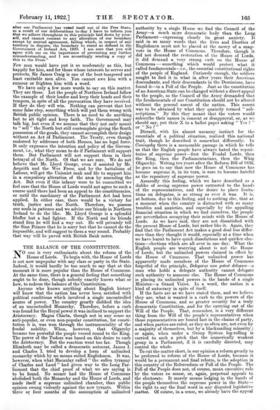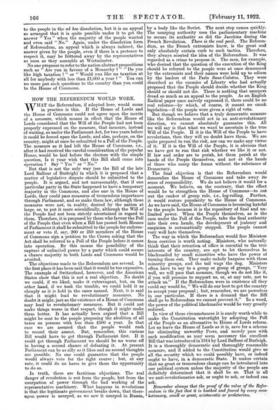THE BALANCE OF THE CONSTITUTION.
NO one is very enthusiastic about the reform of the House of Lords. To begin with, the House of Lords is not now unpopular with any class or party in the State. Indeed, it would hardly be too much to say that at this moment it is more popular than the House of Commons. At the same time, there is a general feeling that something ought to be done, though _nobody exactly knows what or how, to redress the balance of the Constitution. Anyone who knows anything about English history will know that the nation has never been satisfied with political conditions which involved a single uncontrolled source of power. The country greatly disliked the idea of an uncontrolled Monarchy. Therefore before a curb was found for the Royal power it was inclined to support the Aristocracy. Magna Charta, though not in any sense an anti-popular, or even non-popular constitution, for consti- tution it is, was won through the instrumentality of the feudal nobility. When, however, that Oligarchy became too powerful the people veered round to the King. The power of the Tudors was based on this desire to curb the Aristocracy. But the reaction went too far. Though Elizabeth may be called a democratic autocrat, James I. and Charles I. tried to develop a form of unlimited .monarchy which by no means suited Englishmen. It was, however, when what Macaulay called "the sullen tyranny of Charles and Laud" had given -way to the Long. Par- liament that the chief proof of what we are saying is to be found. No sooner had the House. of Commons -abolished both the Monarchy and the House Of Lords, and made itself a supreme - unlimited chamber, than public ,opinion swung violently against the new tyrants. Within three or four months of the assumption of unlimited authority by a single House We find the Council of the Army—a much more democratic body than the Long Parliament—expressing clearly its great anxiety. It said in so many words that the lives and liberties of Englishmen must not b3 placed at the mercy of a snap- vote in the House of Commons. Therefore, though it did not demand the restoration of the House of Lords, it did demand a very strong curb on the House of Commons — something which would protect what. it called fundamentals—i.e., the essential constitutional rights of the people of England. Curiously enough, the soldiers sought to find it in what in after years their American descendants, and their descendants in the Dominions, have found a Poll of the People. Just as the constitution of no American State can be changed without a direct appeal to the people, so the Council of the Army demanded, that the fundamentals of our Constitution should not be altered without the general assent of the nation. This assent was to be obtained by what they quaintly termed "sub- scriptions." By this they meant that the voters would subscribe their names in consent or disapproval, or, as we should say, put their X to a ballot paper asking " Yes ? " or "No ? '
Disraeli, with his almost uncanny instinct for the essentials of a political situation, realized this national trait, though he described it somewhat differently. In Coningsby there is a memorable passage in which he tells us that the English people have always hated the reposi- tories of supreme power—first the Feudal Lords, then the King, then the Parliamentarians, then the Whig Oligarchy. Writing ten years after the Reform Bill of 1832, he goes on to say that now the House of Commons has become supreme it, in its turn, is sure to become hateful as the repository of supreme power. Assuredly this feeling, which we have described as a dislike of seeing supreme power entrusted to the hands of the representatives, and the desire to place limita- tions on delegates, is as strong as ever it was. It is, at bottom, due to this feeling, and to nothing else, that at a moment when the country is distracted with so many troubles and anxieties, and especially by the appalling financial situation in which we find ourselves, the people are nevertheless occupying their minds with the House of Lords. As we have said, they are not dissatisfied with the present House of Lords, but rather like it. Again, they find that the Parliament Act makes a good deal less differ- ence than they thought it would, especially at a time when we have learnt to have quick dissolutions and quicker elec- tions—elections which are all over in one day. What the English people are worrying about is not the House of Lords, but the unlimited powers claimed in effect by the House of Commons. That unlimited power has apparently made members of the House of Commons forgetful of the principle, Delegatus non potest delegare—a man who holds a delegate authority cannot delegate such authority to someone else. The House of Commons is placing its unlimited powers in the hands of a single Minister-'--a Grand Vizier. In a word, the nation is a kind of autocracy in spite of itself. If the facts are as we have stated them, and we believe they are, what is wanted is a curb to the powers of the House of Commons, and so greater security for a truly democratic Constitution, And for the carrying out of the Will of the People. That, remember, is a very different thing from the Will of the people's representatives when those representatives are bound fast in the chains of party, and when parties are ruled, as they so often are, not even by a majority of themselves, but by a blackmailing minority ; or again, when under a Group System log-rolling is carried to. such a pitch that the numerically weakest group in a Parliament, if it is carefully directed, may control the whole.
To cut the matter short, in our opinion a reform greatly to be preferred to reform of the House of Lords, because it would be a permanent and final reform, is the adoption in this country of the Referendum or Poll of the People. The Poll of the People does not, of course, mean executive rule by the voters en mane, or, again, perpetual appeals to the electorate. It merely means lodging in the hands of the people themselves the supreme power in the State— the right to say the final word in any disputed legislative matter. Of course, in a sense, we already have the appeal to the people in the ed hoc dissolution, but it is an appeal so arranged that it is quite possible under it to get the answer " Yes " when the majority of the people wanted and even said "No." Again, under the dissolution form of Referendum, an appeal which is always indirect, the answer given by the people, even if there is a pretence to respect it, may be frittered away by the representatives as soon as they assemble at Westminster. No one proposes to refer to the nation abstract propositions such as' Are you in favour of a Monarchy ? " "Do you like high taxation ? " or "Would you like no taxation at all for anybody with less than £1,000 a year ? " You can no more put such questions to the country than you could to the House of Commons.



































 Previous page
Previous page